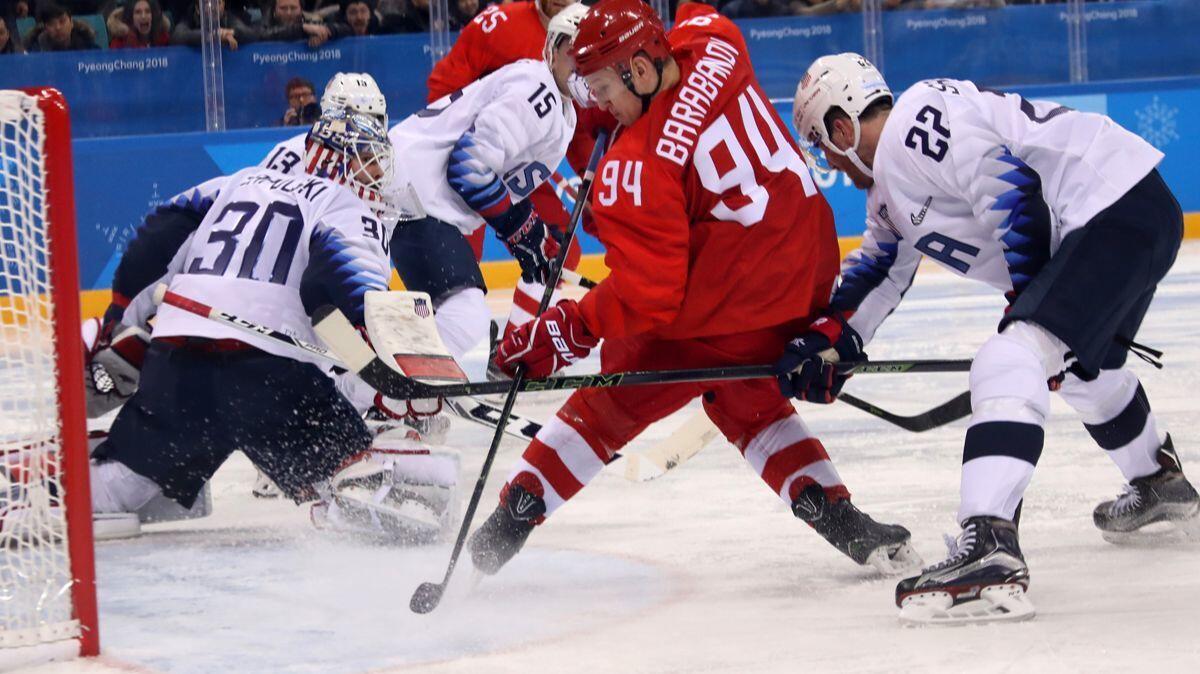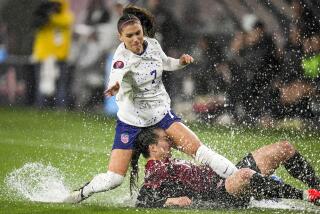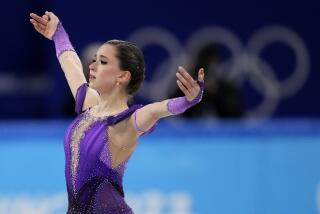Column: U.S. hockey team unlucky in scoring opportunities against Olympic athletes from Russia

U.S. men’s hockey coach Tony Granato insisted his team’s 4-0 loss to the Olympic Athletes From Russia on Saturday wasn’t as bad as the final tally suggested, that the Americans had played well but were unlucky that they couldn’t put away their many scoring chances, especially in the second period of a chippy, emotion-filled game at Gangneung Arena.
“I thought it was a great game. I don’t think it was a 4-0 game, though that’s what the scoreboard says,” Granato said. “It went back and forth at a pretty good pace. It was an NHL pace, that’s for sure.
“I’d like to play this team again sometime. I think they realize they were in a fight out there.”
But now it’s the Americans who are in a fight, and it’s for tournament survival.
The loss dropped them to third place after preliminary-round play in Group B and consigned them to a playoff qualification game on Tuesday. Their opponent will be determined by the final preliminary-round games involving Groups A and C on Sunday. The Olympic Athletes From Russia, the two other group winners, and the team with the best second-place record will advance directly to the quarterfinals.
“When your back’s against the wall I hope we’re going to show our best,” U.S. goaltender Ryan Zapolski said. “We’ve done a lot of good things the first three games. We just haven’t found a way to score enough goals. It’s going to come with time, so we just have to find a way to buckle down now.”
They couldn’t find a way to beat Russia goalie Vassili Koshechkin, who made 29 saves. Their chances in the second period included a four-on-three power play and a breakaway by Brian Gionta, but the Russians held them off and then deflated them by taking a 3-0 lead with two-tenths of a second left in the period on a blistering shot from the right circle by former NHL 50-goal scorer Ilya Kovalchuk. “I still have left some gas in my tank,” said Kovalchuk, who will be 35 in April but might return to the NHL next season after his Russian contract expires.
Russia’s first two goals were scored by left wing Nikolai Prokhorkin, who was drafted by the Kings in 2012 and played eight games for their farm team in Manchester, N.H., in 2012-13 but returned to Russia to honor a contract he had signed there. He’s still on the Kings’ reserve list. Assistant general manager Michael Futa said via email that he has visited Prokhorkin often and last week texted with the 24-year-old forward, who has one year left on his contract with SKA Saint Petersburg of Russia’s Kontinental Hockey League.
Players from SKA Saint Petersburg and CSKA Moscow own all but two spots on the Russian roster, creating cohesiveness that can be important in a tournament like this. “I think their chemistry is hard to match,” said Ryan Donato, one of four college players on the U.S. team. “They always know where each other are.”
That was true on Prokhorkin’s first goal, which he scored from close range on a fine feed at 7:21 of the first period. He also scored on a wrist shot from the left circle at 2:14 of the second period. Prokhorkin said — in English — that he didn’t speak enough English to talk to reporters. Kovalchuk, who spent 11 seasons in the NHL, had no such limitation.
“I think we played well. We came out strong. Our goalie made some great saves and I think our PK [penalty killing] was special tonight,” Kovalchuk said. “It’s always special to play North American teams. You know they will always show up.”
Granato was angry when Russia coach Oleg Znarok put out his big guns for a late power play while holding a 4-0 lead, but it wasn’t completely outlandish because goal differential can be crucial in determining playoff seeding. The best way for the U.S. to have avoided that would have been to not fall so far behind.
Defenseman Jon Blum of Ladera Ranch acknowledged the goal late in the second period was a tough blow and said the Americans needed to be more persistent and capitalize on rebounds around the net. They still believe they can skate with Russia. “I don’t think we should hang our heads low about that effort,” he said. “We played pretty hard but they scored on their chances and we didn’t.”
That’s what the scoreboard said. What the scoreboard says after their next game will be even more important.
Follow Helene Elliott on Twitter @helenenothelen
More to Read
Go beyond the scoreboard
Get the latest on L.A.'s teams in the daily Sports Report newsletter.
You may occasionally receive promotional content from the Los Angeles Times.






